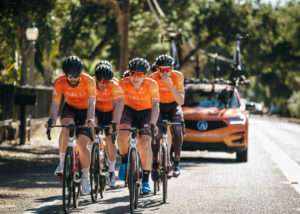Podcast: Play in new window | Download (Duration: 31:01 — 28.4MB)
Subscribe: Apple Podcasts | Spotify | More
Professional road cyclists were once self-sustaining athletes. Vehicle support wasn’t allowed in races like the Tour de France unless via unscrupulous means. Catching a rider getting assistance from a car meant disqualification.
Much has changed. With various other company relationships for bicycles, helmets, sunglasses and energy food, vehicle sponsorship is as much part of a team as its riders.

Race organizers rely on manufacturer vehicles to keep the race intact and safe as it progresses along country roads and into mountain ranges.
Andrew Bajadali, a former pro cycling and director with the Rally Cycling Team, is our guest this week on Episode #119 of The Weekly Driver Podcast. We discuss how pro cycling teams rely on team vehicles to assist their riders.
Co-host James Raia talks with Bajadali from the passenger seat of a 2019 Acura RDX during the opening day of the team’s training camp in Oxnard, California. Bruce Aldrich, the broadcast’s other co-host, produced the episode from Sacramento.
During more than a four-hour team ride along the Pacific Coast Highways and into the surrounding foothills, Bajadali and I discuss the learning curve of the transition of a pro career into a director’s role. It includes learning from other directors the ins-and-outs driving during races that may 150 cyclists and several-dozen team cars
“A team car is really there to support in all ways,” said Bajadali. “I don’t know if people who don’t know the ins-and-outs of the sport know how important it is to have a car there. It’s a major luxury.”
Unlike cycling teams of yesteryear that relied on panel vans or mini cars with questionable reliability, most current teams opt for all-wheel drive wagons or SUVs. One now-defunct team in recent years had two Porsche Panamera sports cars as support vehicles. It didn’t go well.
During training and races, team vehicles transport extra bikes, wheels, various equipment, food, water and medical equipment. If a race includes 20 teams, 40 team vehicles, plus official race vehicles, all advance along the route in an ever-changing processional that also may include 150 riders. Every team’s vehicles are detailed in team colors and have signage for its sponsors.
A road race may advance smoothly for hours on a long, open road. But chaos can occur in an instant after a crash. Team cars require skilled drivers, usually former pro cyclists, who negotiate winding roads often at high speeds to assist riders.
“Basically, you’re just always learning,” said Bajadali who first drove a team car in the early season Dubai Tour. “It was amazing just to see a race on that level. You learn a lot. It was my first day driving solo. You’re just working your way up in understanding. A few years into it, you find your groove and your way of doing things. You just have to get in there and get your hands dirty.”
If a cyclist needs a new bike or medical assistance, the exchange between the team car and rider is similar to a pitstop in auto racing. It’s not uncommon for riders to take advantage of a team car’s speed and hang on too long for a rest. But race officials are watchful for infractions.
“Team cars in road cycling is just part of the game,” said Bajadali, who rode as a passenger in team cars before assuming driving responsibilities. “It kind of equalizes the race where everyone has that kind of support and you can get down to business and do tactics and fast racing.”
The Weekly Driver Podcast encourages and appreciates feedback from our listeners. Please forward episode links to family, friends and colleagues. And you are welcome to repost links from the podcast to your social media accounts.
Support our podcast by shopping on Amazon.com.
Please send comments and suggestions for new episodes to James Raia via email: [email protected].
All podcast episodes are archived on www.theweeklydriver.com/podcast
Every episode is also available on your preferred podcast platform:
Google Play
iTunes
Spotify
Stitcher
iheartradio
Article Last Updated: March 31, 2020.






